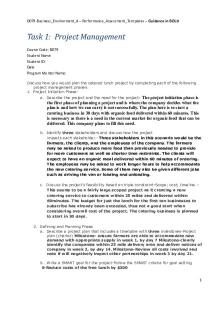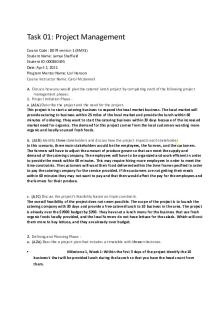Chris Ryals BZM1 Task 1 PDF

| Title | Chris Ryals BZM1 Task 1 |
|---|---|
| Author | Christopher Ryals |
| Course | Introduction to Humanities |
| Institution | Western Governors University |
| Pages | 3 |
| File Size | 82 KB |
| File Type | |
| Total Downloads | 80 |
| Total Views | 129 |
Summary
Download Chris Ryals BZM1 Task 1 PDF
Description
C100 Task1
Christopher Ryals
03/06/2020
C100 Introduction to Humanities Task 1 Christopher Ryals Beethoven, Piano Concerto no. 5 in E flat major, Op. 73 (Emperor Concerto), 1809-1811 Western Governors University 03/06/2020
C100 Task1
Christopher Ryals
03/06/2020
Beethoven, Piano Concerto no. 5 in E flat major, Op. 73 (Emperor Concerto), 1809-1811 A1: The Romantic Era, also known as Romanticism, started in Europe around 1830 and ended around 1900 as musical compositions became inventive and increasingly expressive. Breathtaking operas, superlative piano music, and romantic songs took influence from art and literature of the time. The Romantic Era was known for its intense passion and energy. The uncompromising forms of classical music led the way to larger expressions, and music drew closer to theatre, art and literature.
A2: Beethoven’s Piano Concerto no. 5 was begun in 1808 and completed in 1809 despite that Vienna was under bombardment from Napoleon’s troops. It was known for its brilliance, courageous melodies, and fearless spirit. This piece is romantic, emotional, sensational, and alluring. Solo pianist, horns, and a blending of symphonious movements is an art form of classical work. Because of it’s extremely powerful gestures, it is considered one of the first great 19th century romantic concertos The passion and emotion that Beethoven produced in this piece due to hurdles in his personal life broke the mold of Classical music of his time ushering in the era of Romanticism which narrative, originality and emotion were all meaningful.
A3: Beethoven’s use of melodies was one of the ways that his music influenced romantic composers. A melody is a sequence of notes that the listener hears as a single sound. It’s these sequences of notes that musically satisfying and the most memorable part of a song. Beethoven’s music was influential in the transition from Classical to the Romantic period. His use of large orchestras, and piano solos accompanied with vocals with instrumentals overwhelmed with Classical period composers whose work was short with little difference between pieces.
C100 Task1
Christopher Ryals
03/06/2020
Bibliography
Classic FM. (n.d.). Retrieved March 6, 2020, from https://www.classicfm.com/discovermusic/periods-genres/romantic/ Piano Concerto No. 5 (Beethoven). (2019, September 16). Retrieved March 6, 2020, from https://en.wikipedia.org/wiki/Piano_Concerto_No._5_(Beethoven) Schwarm, B. (2016, November 14). Emperor Concerto. Retrieved March 6, 2020, from https://www.britannica.com/topic/Emperor-Concerto Wight, C. (2014, March 13). Ludwig van Beethoven (1770-1827). Retrieved March 6, 2020, from http://www.bl.uk/onlinegallery/onlineex/musicmanu/beethoven/index.html...
Similar Free PDFs

Chris Ryals BZM1 Task 1
- 3 Pages

Chris Salvatore
- 3 Pages

Notes 10-1 - Chris Hawn
- 4 Pages

PCE Task 1 - Task 1
- 2 Pages

Task 1 - SUS101 Task 1
- 2 Pages

Qht1 task 1 - Task 1
- 3 Pages

QBM1 Task 1 - Task 1
- 5 Pages

C365 - Task 1 - Task 1
- 4 Pages

Task 1 - C226 Task 1
- 11 Pages

C304 Task 1 - TASK 1
- 16 Pages

DIT1 TASK 1 - Task 1
- 4 Pages

D078 Task 1 - task 1
- 2 Pages

SET 2 - Chris Blanar
- 18 Pages

Task d079 copy - Task 1
- 3 Pages

HMc Daniel Task 1 - Task 1
- 9 Pages
Popular Institutions
- Tinajero National High School - Annex
- Politeknik Caltex Riau
- Yokohama City University
- SGT University
- University of Al-Qadisiyah
- Divine Word College of Vigan
- Techniek College Rotterdam
- Universidade de Santiago
- Universiti Teknologi MARA Cawangan Johor Kampus Pasir Gudang
- Poltekkes Kemenkes Yogyakarta
- Baguio City National High School
- Colegio san marcos
- preparatoria uno
- Centro de Bachillerato Tecnológico Industrial y de Servicios No. 107
- Dalian Maritime University
- Quang Trung Secondary School
- Colegio Tecnológico en Informática
- Corporación Regional de Educación Superior
- Grupo CEDVA
- Dar Al Uloom University
- Centro de Estudios Preuniversitarios de la Universidad Nacional de Ingeniería
- 上智大学
- Aakash International School, Nuna Majara
- San Felipe Neri Catholic School
- Kang Chiao International School - New Taipei City
- Misamis Occidental National High School
- Institución Educativa Escuela Normal Juan Ladrilleros
- Kolehiyo ng Pantukan
- Batanes State College
- Instituto Continental
- Sekolah Menengah Kejuruan Kesehatan Kaltara (Tarakan)
- Colegio de La Inmaculada Concepcion - Cebu
